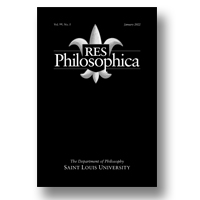|
articles |
|
1.
|
Res Philosophica:
Volume >
100 >
Issue: 2
John Heil
The Last Word on Emergence
abstract |
view |
rights & permissions
| cited by
The metaphysical doctrine of emergence continues to exert a powerful pull on philosophers and metaphysically inclined scientists. This paper focuses on a recent account of emergence advanced by Jessica Wilson in Metaphysical Emergence, but the discussion has the broader aim of making explicit some of the underlying themes that inspire thoughts of emergence generally. These prove to be, not merely optional, but largely lacking in merit.
|
|
|
|
|
2.
|
Res Philosophica:
Volume >
100 >
Issue: 2
Roy T. Cook
Perspectival Logical Pluralism
abstract |
view |
rights & permissions
| cited by
Logical pluralism is the view that there is more than one formal logic that correctly (or best, or legitimately) codifies the logical consequence relation in natural language. This essay provides a taxonomy of different variations on the logical pluralist theme based on a five-part structure, and then identifies an unoccupied position in this taxonomy: perspectival logical pluralism. Perspectival pluralism provides an attractive position from which to formulate a philosophy of logic from a feminist perspective (and from other, identity-based perspectives, such as critical race theory). An example of how such an account might be developed is sketched. The essay concludes by defusing an obvious objection to the perspectival approach: the claim that the correct logic (or logics), in virtue of the formal nature of logic, should be independent of considerations regarding the identity of the reasoner.
|
|
|
|
|
3.
|
Res Philosophica:
Volume >
100 >
Issue: 2
Ali Hossein Khani
Intention, Judgment Dependence, and Self-Deception
abstract |
view |
rights & permissions
| cited by
Crispin Wright’s judgment-dependent account of intention is an attempt to show that truths about a subject’s intentions can be viewed as constituted by the subject’s own best judgments about those intentions. The judgments are considered to be best if they are formed under certain cognitively optimal conditions, which mainly include the subject’s conceptual competence, attentiveness to the question about what the intention is, and lack of any material self-deception. Offering a substantive, nontrivial specification of the no-self-deception condition is one of the main problems for Wright. His solution is to view it as a positive presumption, which is violated only if there is strong evidence to the effect that the subject is self-deceived. In this article, I will argue that the concern about self-deception in Wright’s account is misplaced and generally unmotivated.
|
|
|
|
|
4.
|
Res Philosophica:
Volume >
100 >
Issue: 2
Jonathan C. Rutledge
Humean Arguments from Evil, Updating Procedures, and Perspectival Skeptical Theism
abstract |
view |
rights & permissions
| cited by
In a recent exchange with prominent skeptical theists, Paul Draper has argued that skeptical theism bears no relevance to Humean versions of the argument from suffering. His argument rests, however, on a particular way of construing epistemically rational updating procedures that is not adopted by all forms of skeptical theism. In particular, a perspectival variety of skeptical theism, I argue, is relevant to his Humean arguments. I then generalize this result and explain how any argument from evil employing probabilistic premises is similarly threatened.
|
|
|
|
|
5.
|
Res Philosophica:
Volume >
100 >
Issue: 2
René Ardell Fehr
Thomas Aquinas on Malice:
Three Interpretive Errors
abstract |
view |
rights & permissions
| cited by
This article addresses three interpretive errors that are common with respect to Thomas Aquinas’s understanding of malice. The first error concerns the interpretation of malice as consisting in the preference or choice of a lesser good over a greater good. I argue that malice instead consists in a disorder of the will, and where that disorder results in the choice of a spiritual evil. The second error occurs when one charges Thomas with inconsistency: it is claimed that Thomas’s view of the will is incompatible with malicious actions. I argue that such claims rest on a mistaken understanding of the role of choice in Thomas’s thought. The third error is one of translation: some scholars caution against translating Thomas’s malitia as “malice.” The reasons that are usually given for this view do not hold up to scrutiny.
|
|
|
|
|
6.
|
Res Philosophica:
Volume >
100 >
Issue: 2
Thomas Marré
Kant on Natural Ends and the Science of Life
abstract |
view |
rights & permissions
| cited by
In this article I argue that the mechanical inexplicability of natural ends in the third Critique is best understood against the background of a fairly traditional picture of the metaphysics of living things, one embraced by Kant himself. On this picture, the distinctive unity of a living thing was to be explained by a soul, form, or monad. The constraints placed on the understanding in the first Critique, however, make such an explanation impossible: because the principle of a living thing in virtue of which it constitutes a whole—rather than a mere aggregate of things—is simple, it cannot be met with in space. By ruling out a widely accepted explanans for a well-recognized explanandum, in other words, Kant’s first Critique makes living things inexplicable in precisely those ways suggested by the third.
|
|
|
|
|
discussion |
|
7.
|
Res Philosophica:
Volume >
100 >
Issue: 2
Peter J. Graham
Sosa on the New Evil Demon Problem
view |
rights & permissions
| cited by
|
|
|
|
